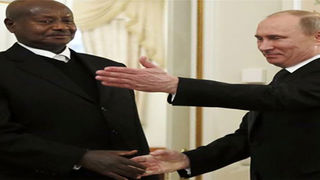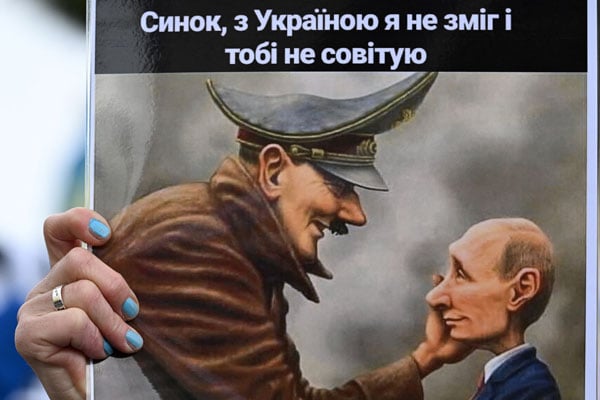
President Museveni (left) and his Russian counterpart Vladimir Putin at a previous meeting. PHOTO/ FILE
|People & Power
Prime
Russia’s invasion of Ukraine and what it means for Africa
What you need to know:
- Given how high military spending tends to be, it is very likely that some Western European countries will at least cut back some of their aid donations to Africa in order to focus on their own security priorities.
The invasion of Ukraine by the Russian Federation on the morning of February 24 marked a new period in recent world history.
It was the largest military invasion of one European country by another since the World War II more than seven decades ago.
The consequences and implications of the Russian invasion are so huge, there is barely any space to discuss them all.
For this article, the focus will be on how all of this impacts on Africa, if at all. There cannot be any good news or benefit for Africa from this serious security development in Europe.
South Africa’s currency, the rand, opened 0.9 percent lower against the US dollar on Thursday, February 24, as news of Russia’s war on Ukraine rattled stock markets and money markets around the world.
The drop in value of the rand relative to the US dollar was an indication of a flight to safety underway; investors, jolted by the invasion and the uncertainty sure to follow, were pulling out their money and redirecting it to the US dollar, which is generally regarded as a currency of safety during turbulent times.
Over the next few days
This means that over the next few days and weeks, depending on how the Russia-Ukraine conflict unfolds, various other African currencies could start to see their value drop against the dollar.
Right now, about 34 African countries are struggling with a high debt-to-GDP ratio.
They have been struggling to repay their mounting international debt and any strengthening of the dollar against their national currencies only makes it more difficult for them to repay their debts.
In addition, inflation has been on the rise in recent months, not just in Uganda but across the globe, evidence of which can be seen in the pump price of petrol at Shs5,000 a litre and above.
As news came in of the Russian invasion, the price of a barrel of crude oil rose by over eight percent to above $104, the highest price since 2014.
Since most African countries are dependent on petroleum imports, this rise in the price of oil will add to their post-corona economic stress.
Also, as the possibility of a Russian invasion of Ukraine appeared inevitable, Germany announced on February 22 that it was cancelling the gas pipeline project with Russia that would have delivered liquefied natural gas to Western Europe from Russia.
The price of a thousand cubic metres of natural gas, on the day of the Russian invasion, rose by between 48 percent and 57 percent.
This gas price hike comes deep in winter in Europe, not to mention recent increases in the price of petrol at the pump and general commodity inflation in Europe.
The countries along Africa’s Mediterranean coast that usually receive the bulk of European tourism to Africa (Egypt, Morocco, Tunisia, Algeria) will notice a marked drop in the number of tourist arrivals this year.
Related to this is the change of mood in Western Europe. For the past 70 or so years since the end of World War II, Western Europe has come to take peace and prosperity for granted.
Yes, the 1945-1990 Cold War kept many Europeans fearful of nuclear war; but in general, thanks to the existence of Nato and US military bases and thousands of US troops stationed in West Germany and the United Kingdom, the average Western European could expect to live a life of relative comfort and complacency.
This Russian invasion of Ukraine will snap many a European government, political leader, and citizen out of this complacency.
ALSO READ: Wars in Europe since fall of Berlin Wall
When former US President Donald Trump insisted that America’s European Nato partners should start to contribute more to Nato’s budget and troop strength, because of the general hostility to Trump in Europe, this call was ignored as yet more proof of how unbalanced President Trump was.
Starting to make sense
Now, the logic of the Trump administration is starting to make sense. Every European country now feels vulnerable and exposed. Nato secretary general Jens Stoltenberg underscored this news reality when in a press statement on February 24 he said the Russian invasion has changed Europe.
A greater focus on defence spending and an increase in troop strength is sure to follow across Europe.
Given how high military spending tends to be, it is very likely that some Western European countries will at least cut back some of their aid donations to Africa in order to focus on their own security priorities that this invasion has now clearly shown the need for.
Another consequence will be felt in West Africa, where Russian mercenaries and military advisors have been supporting governments in their offensive against militant Islamic groups.
If Western sanctions against Russia begin to strangle the Russian economy, some of this Russian military personnel could be withdrawn, leaving countries like Mali and the Central African Republic vulnerable to a resurgence of local rebels (CAR) or jihadists (Mali).
All these factors might come into play; even if they don’t, any two or three of them unfolding, were they two, would be enough to have a major effect on African economies.
The invasion of Ukraine comes in the wake of the two-year economic trauma of the global Covid-19 pandemic.
The Covid-19 economic contraction had, in and of itself, already wreaked havoc on Africa’s current account balance and international trade, as well as domestic economy.
The fallout from the Ukraine invasion will tip Africa over into economic misery of the kind seen in the 1970s and 1980s.





